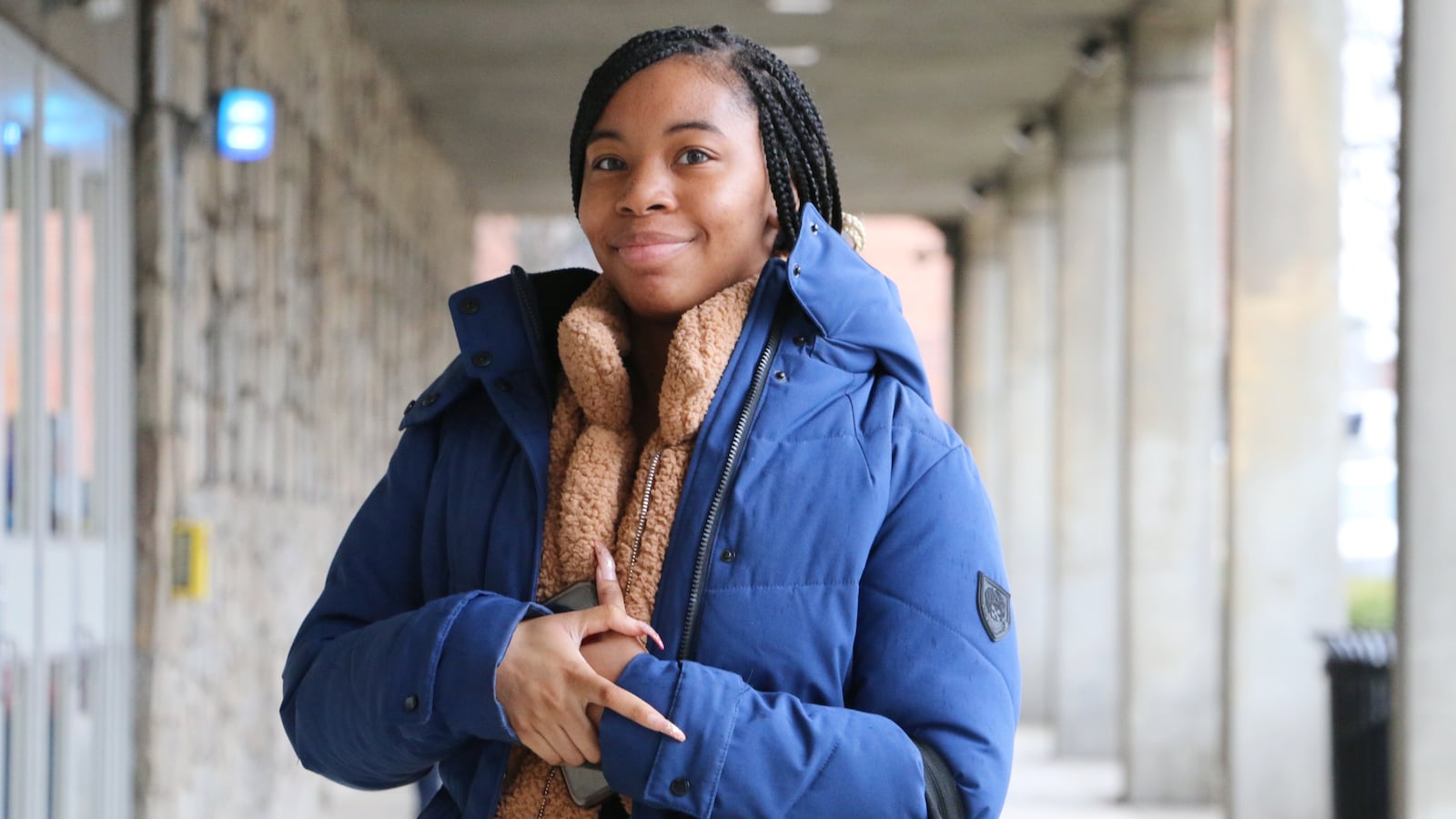Before the coronavirus swept in, Samani Ford had a trusted system for achieving her goals: dream, plan, and execute.
A freshman at Rutgers University-Newark, her dream is to become a genetic counselor and help people navigate the health issues her extended family has faced, including cancer and bipolar disorder. Her plan to accomplish that dream is to excel at Rutgers, then earn a master’s degree and maybe a doctorate.
By the start of her second semester in January, Ford was in full execution mode: She fine tuned a routine for making the 25-minute drive from her mother’s home in Irvington to campus, attending class and completing her assignments there, then returning home to eat and sleep.
But on March 10, the coronavirus forced Rutgers to cancel classes at its three campuses and send its 70,000 students home early for spring break. A week later, the university closed campuses for the rest of the school year.
The changes turned Ford’s life upside down. Now she was stuck in the basement of her crowded house trying to follow choppy video lectures. She found a job at a local grocery store, where she wore a mask and gloves hoping she wouldn’t carry the virus home. She communicated with friends and professors only through devices. Suddenly, she questioned whether she could maintain her hard-won momentum towards a degree — and her dreams.
“I was in a good position before the coronavirus happened,” she said. Then the pandemic scattered the pages of her college playbook, leaving her plans in disarray. “I kind of left everything in the wind.”
College freshmen such as Ford are especially vulnerable to the coronavirus’ disruptions. Even in normal times, the first year is a roller coaster when recent high schoolers must quickly forge a sense of belonging and self-confidence on campus in order to thrive, said Vincent Tinto, a professor emeritus at Syracuse University. “It lays the groundwork for subsequent success,” he said.
When freshmen stumble, the results can be disastrous. Nationwide, more than a quarter of first-year college students — and a third of black students — don’t return for their second year.
‘Everything has changed so fast.’
Even if students do persist past the first year, their odds of graduating remain alarmingly low. Nearly 40% of students at four-year colleges and universities fail to graduate within six years, leaving many saddled with debt and shut out of lucrative careers. Low-income students, including many in Newark, face the greatest risk of being dragged down — by financial hardships, family obligations, or K-12 schooling that did not prepare them. Students from families in the bottom income quartile are less than half as likely as students in the top quartile to obtain bachelor’s degrees within six years.
Those dismal college completion rates have put pressure on high schools to better equip students for college, and on higher-education institutions to guide their students to degrees. A small number of organizations have tried to attack the problem from both ends. One of them is KIPP, the national charter school network where Ford attended middle and high school. It has developed an elaborate system called “KIPP Through College” designed to steer students onto campuses then shepherd them across the graduation finish line.
The system is expensive and labor-intensive, and even with it many KIPP alumni leave college without degrees. Still, the approach is catching on with some districts, including Newark Public Schools. The district has sent some of its counselors to study KIPP’s college-advising methods, and the superintendent has promised to pair each student with a mentor who will stick with them through college.
If there was ever a moment when striving college students like Ford most needed the extra support — and when support systems like KIPP’s faced the ultimate test — it is now, as the coronavirus unleashes an avalanche of new obstacles on their path to a degree.
“I don’t like when things change,” Ford said this month. “And everything has changed so fast.”
Finding the right match
Samani Ford attended KIPP Rise Academy in Newark’s West Ward, where a beloved fifth-grade math teacher was forever intoning, Carpe diem, carpe diem. It wasn’t until Ford was in high school, at KIPP’s Newark Collegiate Academy, that she learned the meaning of that Latin aphorism: “Seize the day.”
“It always sat with me,” she said. “Like, do not take anything for granted.” She had the phrase tattooed above her heart.
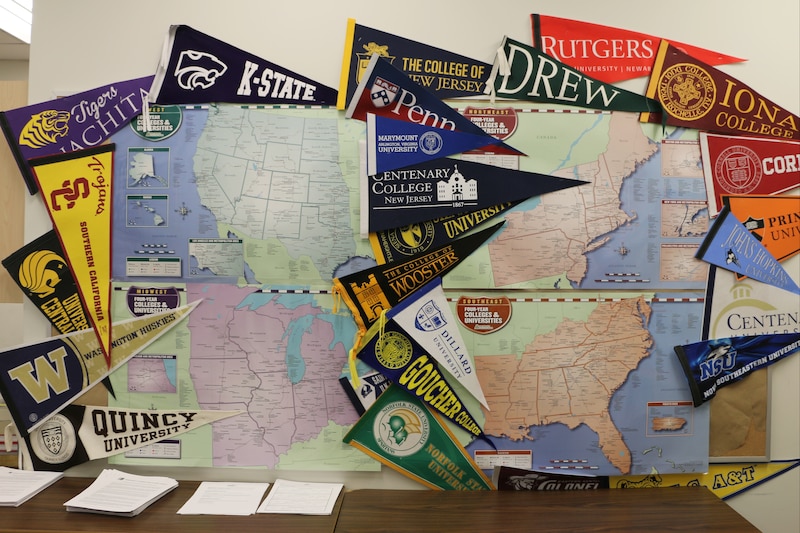
Ford lived by those words. She founded and captained a high school dance team, the Pouncing Panthers, and worked after school at a children’s party venue, Pump It Up, using her earnings to help pay for her car and prom expenses. And she studied endlessly, pursuing her game plan to attend a college where she could conduct research on her path to becoming a genetic counselor.
When Ford needed to recharge, she would visit the office of Natasha Stone, the college placement counselor. A Newark native, Stone related to Ford’s relentless drive, but also recognized the anxiety that sometimes gripped Ford as she juggled work and dance, family drama and AP classes.
So when Ford stopped by, Stone would sometimes dim her office lights, ask Ford to breathe deeply, and remind her: “While life is throwing you a lot of curve balls you didn’t expect, you’re still crushing it.” Only then would they resume their search for Ford’s ideal “college match.”
Since launching inside a Houston middle school in 1994, KIPP has grown into the nation’s largest nonprofit charter school network, with more than 100,000 students ranging from preschool to 12th grade. Throughout, an overriding mission has fueled the schools: “to help students climb the mountain to and through college,” as CEO Richard Barth put it last year. And, indeed, researchers have found that KIPP students — 95% of whom are black or Hispanic — are far more likely than their peers to enroll in college.
Yet, compared with its success propelling students to college, KIPP has had more trouble getting them to graduate. While 80% of KIPP alumni have enrolled in college, only 40% have earned degrees, according to KIPP’s internal data, which is cumulative through 2018 and includes KIPP high school graduates as well as middle school graduates who attended non-KIPP high schools. In Newark, only a third of KIPP high school graduates who headed to college in 2011 had earned bachelor’s degrees six years later, according to an analysis by the Newark City of Learning Collaborative at Rutgers-Newark.
In one sense, this is a victory. KIPP alumni are significantly more likely than the average black or Hispanic adult to attain degrees. And in Newark, KIPP’s college-bound graduates are about twice as likely to earn degrees in six years as their peers in Newark’s non-selective public high schools. (The district enrolls larger shares of English learners and students with disabilities than KIPP.) But the gulf between college enrollment and completion still means that KIPP is falling short of its promise to thousands of students — and the students are falling short of their dreams.
A key way that KIPP has responded to that challenge is by refining its college-advising process. Counselors try to steer high schoolers to institutions where they have the greatest odds of success based on the institutions’ graduation rates and financial aid offerings and that also appeal to students’ preferences. “How you go about the college application process can be worth 5 to 10 points in college graduation rates,” Barth told Education Post.
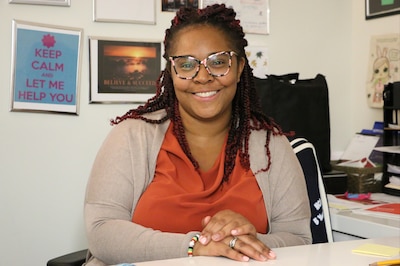
One morning in her office at KIPP’s Newark high school, Stone pulled up a student’s file to illustrate the process in action.
The student was a senior with a 3.1 GPA and a score of 20 on the ACT, landing her near the middle of the pack among test-takers. With Stone’s help, she had compiled a “wish list” of colleges, then used KIPP’s college-match software to review each institution’s graduation rate for black and Hispanic students, the average amount that KIPP alumni at each school still owed after receiving financial aid, and the student’s odds of admission to each school based on her grades and test scores.
KIPP requires its students to apply to at least nine institutions, including a few competitive “reach” schools. The aim is to avoid “undermatching,” where high-achieving low-income students choose less-selective colleges that are often less likely to get students to graduate. This senior submitted 16 applications, including to less competitive institutions such as Centenary University but also more selective ones such as Spelman College. Once the acceptance and award letters began to arrive, she and Stone calculated how much loan debt each college would leave her with.
“Data gives us the information we need to counsel students,” Stone said. “Our students are very informed.”
In recent years, KIPP has been sharing its college-matching strategies with other districts. It started with the San Antonio Independent School District in 2015, and in 2018 KIPP announced four other partners: the Newark, New York City, and Miami-Dade County school districts and the Aspire charter school network. The Bill & Melinda Gates Foundation, which contributes funding to Chalkbeat, provided a grant for the program.
‘Data gives us the information we need to counsel students.’
KIPP staffers began visiting the three participating Newark high schools — American History, Central, and University — during the 2018-19 school year. Last summer, Superintendent Roger León and several Newark counselors traveled to Houston to take part in training workshops during KIPP’s annual summit.
Kaycee Brock, the KIPP Through College program director who oversees the partnerships, said this school year’s goal is for the counselors to push students to apply to more colleges, including more selective institutions in order to prevent undermatching.
While the district school counselors may be able to borrow some KIPP advising strategies, they must do so with fewer resources than KIPP, whose KIPP Through College program had a $3.8 million budget in the 2018 fiscal year and where the average student-counselor ratio is 100 to 1, far lower than most districts. District-charter partnerships can also present political challenges in cities such as Newark, where the charter sector’s rapid expansion — and recent district efforts to rein it in — have bred distrust.
The Newark school district declined to make León or any counselors available for an interview. But Brock said the program has so far avoided any rivalry or controversy.
“I love that this is not making people choose sides,” she said in an interview last year. “It’s just having people work together and see the value in each other.”
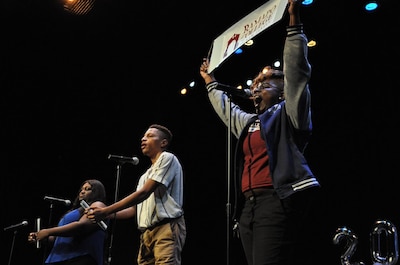
By last spring, Ford had been admitted to 10 of the 11 institutions where she applied, including the University of Delaware and the elite Amherst College. But at her mother’s urging, she chose a school closer to home that would leave her with less debt: Rutgers-Newark.
That June, KIPP’s Newark Collegiate Academy celebrated the Class of 2019’s college choices during its annual “Senior Signing Day” celebration. One after another, the departing seniors took to the stage in a college auditorium to announce the institutions where they were headed: Rutgers, Montclair State, Duke, Notre Dame. As the graduates shouted out their destinations, the junior class roared like fervent fans at a concert.
Ford stayed home that day. She felt she had made the right college choice, yet the enormity of the decision weighed on her.
“It was a lot of pressure and a lot of emotions,” she recalled. “Like saying, ‘This is my future; this is where I’m going.’”
From ‘to’ to ‘through’
In mid-August, with classes just a few weeks away, Ford arrived at KIPP’s downtown Newark offices with her mother, younger sister, and newborn baby brother in tow. She was due to meet Ms. Gewirtz.
At KIPP, every college-bound 12th grader is matched with a “college persistence” counselor. The counselors keep in touch with their students the entire time they’re in college, checking in about grades, bills, and any other issues — academic, financial, or personal — that arise. In New Jersey, KIPP employs five counselors who each oversee more than 80 alumni.
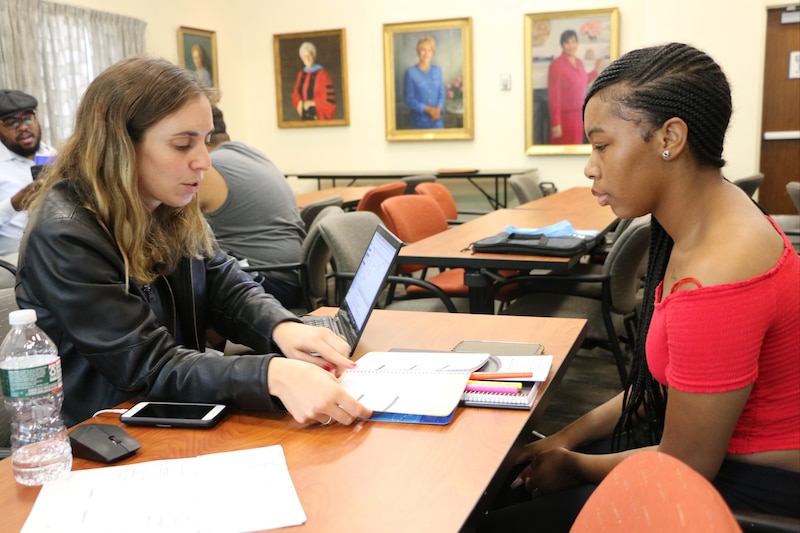
Ford was matched with Amanda Gewirtz, a peppy former high school teacher who graduated from Rutgers-New Brunswick. Gewirtz scheduled the meeting that afternoon to help Ford navigate the maze of paperwork that new students must complete — financial aid forms, health records, course registration, and more. Without such guides, many incoming freshmen get tripped up and abandon college before they even start.
After following Gewirtz into a small conference room, Ford and her mother, Khalilah Miller, rattled off a long list of administrative tasks that needed doing.
“OK, boom. We’re going to do all those things,” Gewirtz said, taking notes in her laptop. “So productive.”
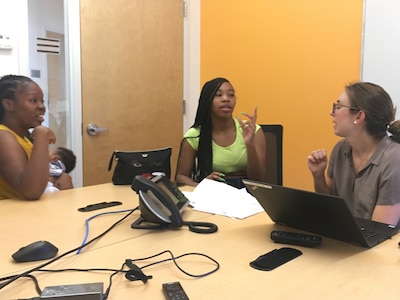
They started with finances. KIPP would provide a small grant and book stipend, but Miller still had to take out loans for the nearly $9,000 in tuition that year not covered by financial aid. Next came academics. Gewirtz advised Ford to introduce herself to professors and join study groups. She also proposed setting a goal for the semester. Ford suggested “not procrastinating,” but Gewirtz pushed for something more concrete. So they made a plan for Ford to map out all her assignments for the semester and study a week in advance for every test.
“I love it, I’m on board with it, let’s do it,” Gewirtz said, giving Ford a high-five.
The meeting had been scheduled to last 20 minutes, but an hour passed and they were still working. Gewirtz had another student to see, so Ford moved into the lobby to finish filling out forms.
Miller sat on a nearby sofa cradling her infant son. With four children and two jobs — she teaches pre-kindergarten during the day and works with special-needs students into the evening — she was grateful that KIPP had guided her daughter through every step of the college-going process. “It took a load off of me as a parent,” she said.
‘If you don’t have that person to check in, we can just drown.’
Miller had set a strong example for Ford. She earned her associate’s degree after becoming a mother when she was 18. She later obtained a bachelor’s degree and is now working on her master’s. Yet as she watched Ford that afternoon complete the final steps to becoming a full-fledged college student, Miller sensed her daughter was destined for even greater heights.
“She’s surpassing me,” Miller said, “and that’s what a mom wants.”
A few weeks later, Ford started at Rutgers. At that point, most school districts would part ways with their former students, no longer providing formal assistance or even tracking their trajectories. In New Jersey, the state reports how many of each high school’s graduates enroll in college, but not how many earn degrees. Nationwide, about half of high school principals and nearly three-fourths of teachers say they don’t have access to data on their former students’ college outcomes. (The Newark school district uses a program called Naviance to track graduates’ outcomes.)
“I think there’s some sense from districts that there’s a handoff,” said Jenny Nagaoka, deputy director of the University of Chicago’s Consortium on School Research. “They’ve fulfilled their duty,” and now their graduates are in colleges’ care.
Another reason for the handoff is financial: K-12 schools can only use public dollars to support current students, not graduates. But major charter school networks such as KIPP have deep wells of privately raised money they can tap to provide persistence counselors and microgrants to their college-going alumni.
KIPP has also formed partnerships with nearly 100 colleges and universities. The partner institutions, including Rutgers-Newark, agree to work hand-in-glove with KIPP staffers to support KIPP alumni. In turn, KIPP counselors advise students to give the schools special consideration during their college search.
“It’s a way for KIPP to be able to hold institutions accountable in a way that individual families may not be able to,” said John Gunkel, Rutgers-Newark’s vice chancellor for academic programs and strategic partnerships, adding that Rutgers provides extensive support to all students, not just those from KIPP.
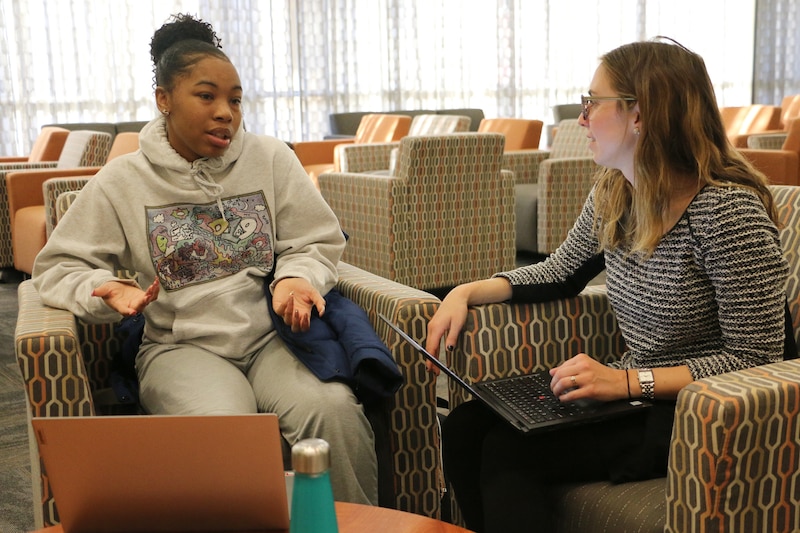
Ford powered through her first semester, improvising solutions whenever obstacles emerged. She didn’t have a laptop, so she found a computer lab. As a commuter, she felt disconnected from campus life, so she applied to become a resident assistant in a dorm the following year. She had help from Rutgers-Newark, which provided a writing tutor and a support group for her algebra class. And she had Gewirtz, who called or FaceTimed every few weeks to ask about classes, work, and life.
“Especially coming from urban areas, it’s not a lot of people that are going to push you,” Ford said. “We’re so used to doing everything on our own. If you don’t have that person to check in, we can just drown.”
In late January, just as the spring semester was starting, Ford and Gewirtz met on campus. Gewirtz was excited: Ford’s fall transcript showed A’s in African-American studies and sociology, a B in psychology, a C+ in writing, and a C in algebra, giving her a 3.1 GPA. But Ford was less enthusiastic.
“Plenty of freshmen get below 2.0’s because it’s such a transition,” Gewirtz told her. “So you should be super proud of yourself.”
“I am, but I’m not,” Ford replied. “I want to do better.”
She set a goal for the spring semester to earn a 3.5 GPA or higher, which Gewirtz eagerly endorsed. They high-fived and Ford headed to class. She was following her game plan, and it seemed to be working.
Then came the pandemic.
‘Bumps in the road’
The first few college campuses started closing in early March, like lights flickering before an outage. Then everything shut down.
KIPP’s corps of college persistence counselors sprang into action. In New Jersey, Gewirtz and her colleagues gathered information about the colleges their alumni attend: How long were campuses closed? Were any dorms still open? Were classes online? Then they surveyed students: Did they have internet access at home? What about food?
“Some were like, ‘I’m home, I have everything I need,’” Gewirtz said. “Others were freaking out.”
KIPP quickly established an emergency relief fund. Counselors used the money to buy laptops, tablets, and wireless hotspots for students who needed them to work from home and gift cards for students who needed help with groceries.
Once their immediate needs were met, students took stock of the abrupt shift to remote learning. To Gewirtz, they complained about technical glitches during online lessons and heavier workloads as instructors replaced lectures with written assignments. They described disrupted sleep schedules and dwindling motivation. First-year students in particular struggled with returning home after so recently setting off on their own.
“Poor things, they’re so thrown off,” Gewirtz said. “They’re right back where they started.”

Rutgers-Newark also scrambled to assist students with the sudden transition. Soon after sending everyone home, the university ordered 200 laptops for students and faculty members who needed them, said Gunkel, the Rutgers-Newark vice chancellor. The administration discouraged live online lectures because they knew many students would have trouble joining from home, he added, including families who found that the free Wi-Fi some internet providers offered during the pandemic was too slow to support real-time videos.
Ford struggled with remote learning. It just wasn’t the same. Instead of lively class discussions about the readings, her literature professor now assigned written responses. A couple instructors had tried teaching over video but ran into technical difficulties and either abandoned live lessons or made them optional, Ford said. Now, it was up to students to review the notes and figure out the assignments themselves.
“I’m annoyed; I don’t like online classes,” she said this month. “It’s better when you’re face to face with somebody.”
Other changes followed. After the children’s party venue closed due to the coronavirus, Ford got a job at an Aldi grocery store sanitizing and stocking the shelves. Her home had become crowded after her aunt and five cousins moved in, joining Ford, her mother, and three siblings. Ford could retreat to her basement bedroom, but she had no desk, so she studied at the dining room table early in the mornings before the children awoke.
‘She’s just like, “You got to make the best of it.”’
Throughout the upheaval, she kept in touch with Gewirtz. Unlike other college students whose ties to campus frayed as the shutdown dragged on, Ford had her counselor urging her to stay focused on her studies.
“Even when I was like, ‘I’m not feeling this,’ she’s just like, ‘You got to make the best of it,’” Ford said. “‘Even if you don’t necessarily feel like getting it done, you just have to.’”
KIPP’s alumni support is a lifeline for students like Ford — especially during the pandemic. But does the KIPP Through College system get more students to graduate?
The network’s internal data show that KIPP alumni earn college degrees at higher rates than their peers from similar socioeconomic backgrounds. And an independent study by the research firm Mathematica found that former KIPP middle school students are far more likely than their peers to enroll in college and somewhat more likely to stay enrolled for at least two years, though the persistence boost was not statistically significant. The study, which was funded by Arnold Ventures, a philanthropy that has given money to KIPP and Chalkbeat, could not isolate which aspect of KIPP’s approach caused the gains.
Even if research can’t definitively say whether KIPP’s college-support system pushes more students across the finish line, experts note that many of KIPP’s practices are backed by research. Those practices include strong college counseling in high school, guidance that steers students to more selective institutions, and intensive advising throughout college.
Still, many KIPP alumni — like other low-income and first-generation students across the country — encounter obstacles during college that KIPP alone would be hard-pressed to remove. In a 2016 survey, nearly 40% of KIPP alumni said they had skipped meals to save money for college expenses. Some colleges have invested heavily in support services for their neediest students; Rutgers-Newark, for instance, created an emergency financial-assistance fund and a food pantry for students. But the very existence of KIPP’s alumni-support program suggests that other colleges have been slow to give students the help they need, said Jenny Nagaoka of the Consortium on School Research.
“This idea that there’s a counselor following students from high school into college in some ways points to a big gap in what’s happening in higher ed,” she said. “If higher education changes, that could make those Bandaid approaches less necessary.”
Now, colleges must attend to all the new difficulties the coronavirus has created for students while also addressing their own existential crisis: How can they operate during a pandemic?
In a May 13 letter to the Rutgers University community, President Robert Barchi said that planning for the fall is ongoing, but “the most likely scenario” is a mix of in-person and remote learning. Meanwhile, the university has announced a hiring freeze and pay cuts for senior officials as it anticipates up to $200 million in lost revenue this quarter. And it is bracing for the loss of some students — both current and incoming — who decide a largely online semester is not worth the cost.
“Rutgers-Newark, and I think most institutions, really are assuming that we can’t count on any students enrolling again in the fall,” Gunkel said. “In some ways, we essentially have to act like we’re recruiting each of our enrolled students.”
Last week, Ford’s grades for the second semester were still being finalized, but she expected them to be lower than she’d hoped before the coronavirus came along. Yet even as some of her friends say they’ll take next semester off if it’s mostly remote, Ford intends to stay enrolled no matter what.
The pandemic has interrupted her carefully laid plans, but it hasn’t changed her dreams.
“I’m going to get there,” she said. “I might have some bumps in the road, but I’m going to get there.”
This story was produced with support from the Education Writers Association Reporting Fellowship program.

